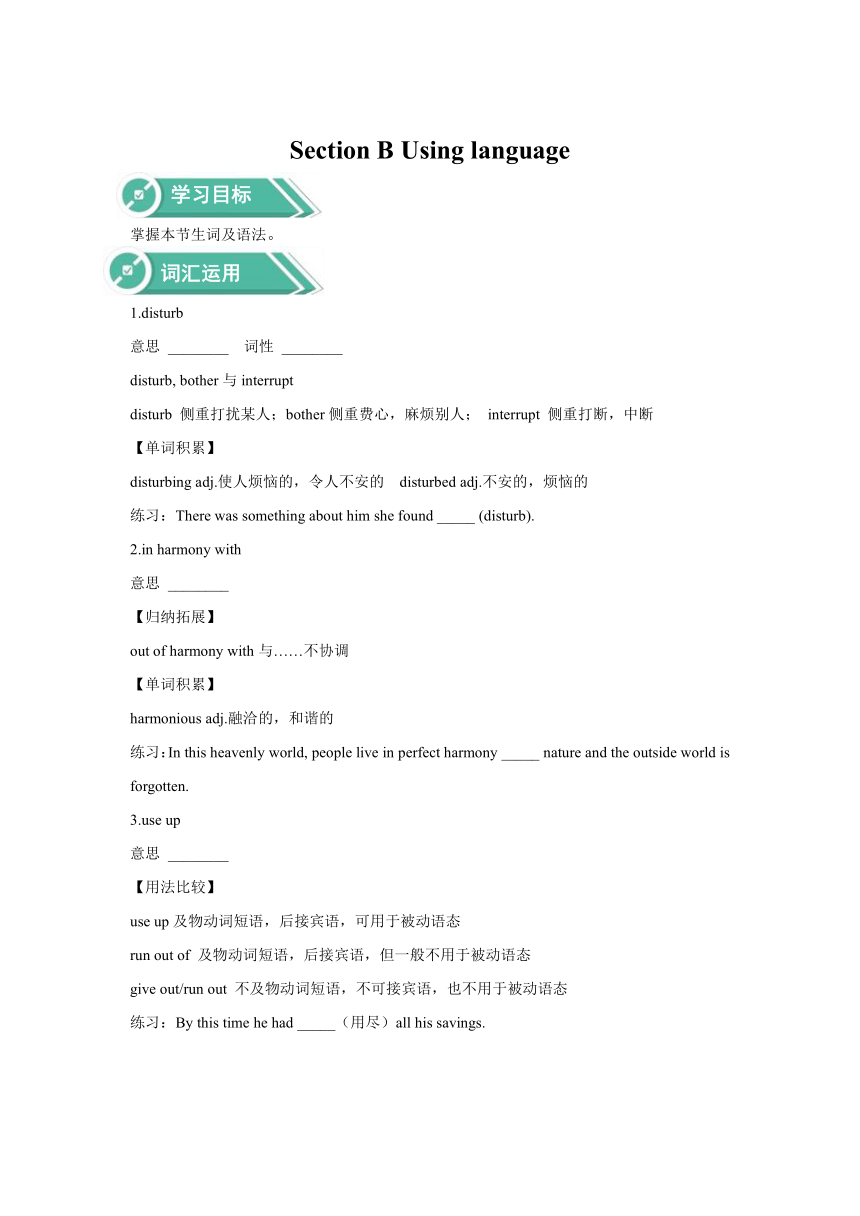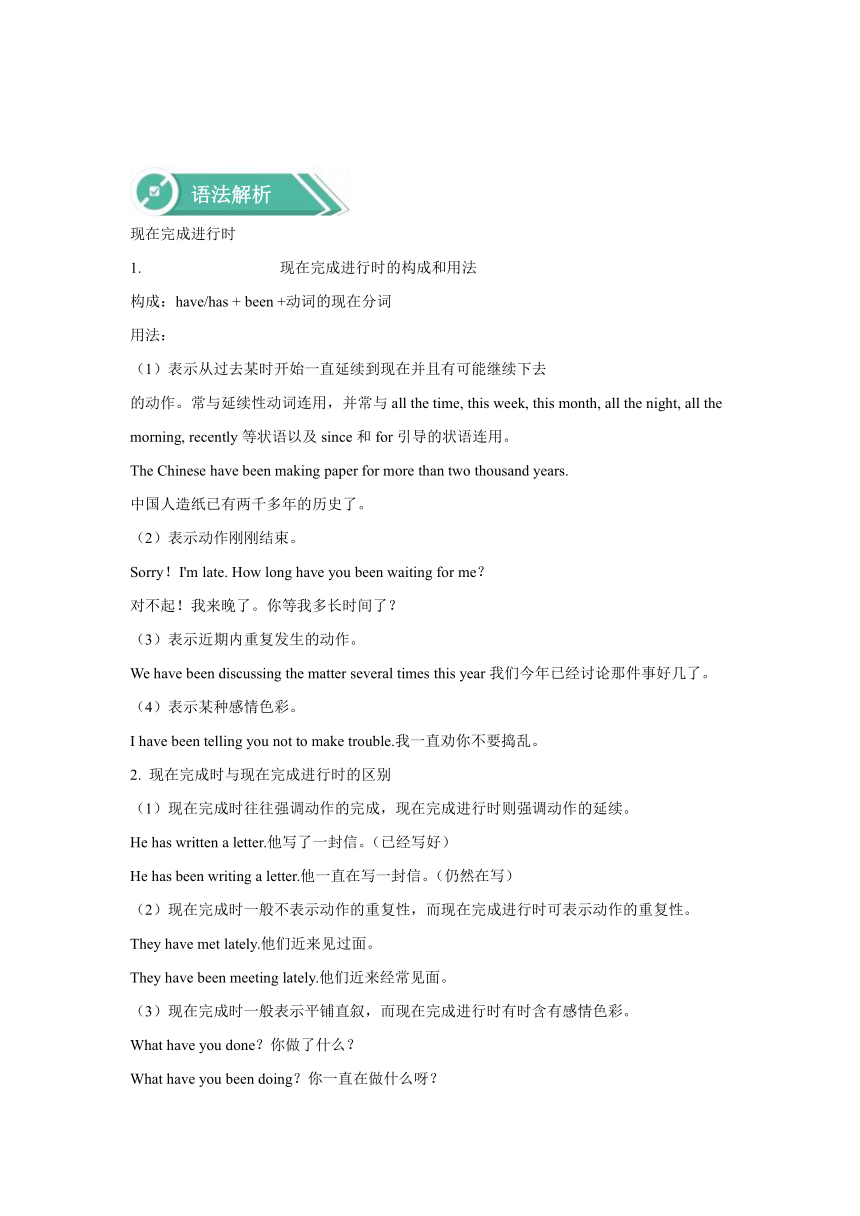外研版(2019)选择性必修第一unit 6 Nurturing nature Section B Using Language(学案)
文档属性
| 名称 | 外研版(2019)选择性必修第一unit 6 Nurturing nature Section B Using Language(学案) |  | |
| 格式 | zip | ||
| 文件大小 | 282.8KB | ||
| 资源类型 | 教案 | ||
| 版本资源 | 外研版(2019) | ||
| 科目 | 英语 | ||
| 更新时间 | 2022-08-28 14:04:01 | ||
图片预览


文档简介
Section B Using language
学习目标
掌握本节生词及语法。
词汇运用
1.disturb
意思 ________ 词性 ________
disturb, bother与interrupt
disturb 侧重打扰某人;bother侧重费心,麻烦别人; interrupt 侧重打断,中断
【单词积累】
disturbing adj.使人烦恼的,令人不安的 disturbed adj.不安的,烦恼的
练习:There was something about him she found _____ (disturb).
2.in harmony with
意思 ________
【归纳拓展】
out of harmony with与……不协调
【单词积累】
harmonious adj.融洽的,和谐的
练习:In this heavenly world, people live in perfect harmony _____ nature and the outside world is forgotten.
3.use up
意思 ________
【用法比较】
use up及物动词短语,后接宾语,可用于被动语态
run out of 及物动词短语,后接宾语,但一般不用于被动语态
give out/run out 不及物动词短语,不可接宾语,也不用于被动语态
练习:By this time he had _____(用尽)all his savings.
语法解析
现在完成进行时
现在完成进行时的构成和用法
构成:have/has + been +动词的现在分词
用法:
(1)表示从过去某时开始一直延续到现在并且有可能继续下去
的动作。常与延续性动词连用,并常与all the time, this week, this month, all the night, all the morning, recently等状语以及since和for引导的状语连用。
The Chinese have been making paper for more than two thousand years.
中国人造纸已有两千多年的历史了。
(2)表示动作刚刚结束。
Sorry!I'm late. How long have you been waiting for me?
对不起!我来晚了。你等我多长时间了?
(3)表示近期内重复发生的动作。
We have been discussing the matter several times this year我们今年已经讨论那件事好几了。
(4)表示某种感彩。
I have been telling you not to make trouble.我一直劝你不要捣乱。
2. 现在完成时与现在完成进行时的区别
(1)现在完成时往往强调动作的完成,现在完成进行时则强调动作的延续。
He has written a letter.他写了一封信。(已经写好)
He has been writing a letter.他一直在写一封信。(仍然在写)
(2)现在完成时一般不表示动作的重复性,而现在完成进行时可表示动作的重复性。
They have met lately.他们近来见过面。
They have been meeting lately.他们近来经常见面。
(3)现在完成时一般表示平铺直叙,而现在完成进行时有时含有感彩。
What have you done?你做了什么?
What have you been doing?你一直在做什么呀?
(4)表示状态、感觉或情感的动词,如see,feel,know,love等,可用于现在完成时,但不可用于现在完成进行时。
They have known each other for ten years.
他们相识已经十年了。(不说They have been knowing..)
练习:
1 I _____ (read) Hemingway's A Farewell to Arms and haven't finished yet.
2 She _____ (sleep) for eight hours and still cannot wake up.
3 Hello! At last! I _____ (telephone) you all the morning.
4 Now that she is out of work, Lucy _____ (consider) going back to school, but she hasn't decided yet.
答案:
词汇运用:1.disturbing 2.with 3.used up/ run out of
语法解析:1.have been reading 2.has been sleeping 3.have been telephoning 4.has been considering
学习目标
掌握本节生词及语法。
词汇运用
1.disturb
意思 ________ 词性 ________
disturb, bother与interrupt
disturb 侧重打扰某人;bother侧重费心,麻烦别人; interrupt 侧重打断,中断
【单词积累】
disturbing adj.使人烦恼的,令人不安的 disturbed adj.不安的,烦恼的
练习:There was something about him she found _____ (disturb).
2.in harmony with
意思 ________
【归纳拓展】
out of harmony with与……不协调
【单词积累】
harmonious adj.融洽的,和谐的
练习:In this heavenly world, people live in perfect harmony _____ nature and the outside world is forgotten.
3.use up
意思 ________
【用法比较】
use up及物动词短语,后接宾语,可用于被动语态
run out of 及物动词短语,后接宾语,但一般不用于被动语态
give out/run out 不及物动词短语,不可接宾语,也不用于被动语态
练习:By this time he had _____(用尽)all his savings.
语法解析
现在完成进行时
现在完成进行时的构成和用法
构成:have/has + been +动词的现在分词
用法:
(1)表示从过去某时开始一直延续到现在并且有可能继续下去
的动作。常与延续性动词连用,并常与all the time, this week, this month, all the night, all the morning, recently等状语以及since和for引导的状语连用。
The Chinese have been making paper for more than two thousand years.
中国人造纸已有两千多年的历史了。
(2)表示动作刚刚结束。
Sorry!I'm late. How long have you been waiting for me?
对不起!我来晚了。你等我多长时间了?
(3)表示近期内重复发生的动作。
We have been discussing the matter several times this year我们今年已经讨论那件事好几了。
(4)表示某种感彩。
I have been telling you not to make trouble.我一直劝你不要捣乱。
2. 现在完成时与现在完成进行时的区别
(1)现在完成时往往强调动作的完成,现在完成进行时则强调动作的延续。
He has written a letter.他写了一封信。(已经写好)
He has been writing a letter.他一直在写一封信。(仍然在写)
(2)现在完成时一般不表示动作的重复性,而现在完成进行时可表示动作的重复性。
They have met lately.他们近来见过面。
They have been meeting lately.他们近来经常见面。
(3)现在完成时一般表示平铺直叙,而现在完成进行时有时含有感彩。
What have you done?你做了什么?
What have you been doing?你一直在做什么呀?
(4)表示状态、感觉或情感的动词,如see,feel,know,love等,可用于现在完成时,但不可用于现在完成进行时。
They have known each other for ten years.
他们相识已经十年了。(不说They have been knowing..)
练习:
1 I _____ (read) Hemingway's A Farewell to Arms and haven't finished yet.
2 She _____ (sleep) for eight hours and still cannot wake up.
3 Hello! At last! I _____ (telephone) you all the morning.
4 Now that she is out of work, Lucy _____ (consider) going back to school, but she hasn't decided yet.
答案:
词汇运用:1.disturbing 2.with 3.used up/ run out of
语法解析:1.have been reading 2.has been sleeping 3.have been telephoning 4.has been considering
